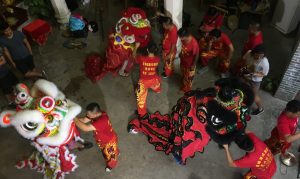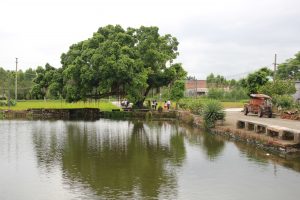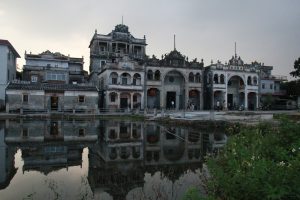Dates: May 27 – June 3, 2024
Location: Jiangmen & Kaiping, Guangdong, China
Apply Here
Program Overview
Across the globe, cultural heritage industries have blossomed and developed around educational and cultural experiences. How do these experiences tell the stories of diasporic family identity? Join this 8-day tour of UNESCO World Heritage Site Kaiping, Guangdong as we explore how the migration history of Cantonese from these rural villages of southern China reshaped both the region and the destinations they migrated to and from all around the world.
The field study is jointly led by UBC history professor Dr. Henry Yu and Wuyi University heritage conservation researcher Dr. Selia Tan. Set in the backdrop of Kaiping, China, and the Cangdong Village Heritage Restoration Project led by Dr. Selia Tan, The Living Roots of Cultural Heritage and Community Economic Growth provides an immersive learning experience focused on cultural heritage development. The program explores applications of successful cultural heritage economic development policy, re-examining colonial approaches to archives and cultural heritage, and how to better respect the ways marginalised communities maintain and transmit their traditions.
Learnings from this trip will benefit those interested in the conservation of cultural heritage in Chinatowns across North America. Chinatowns have become the touchstone for historical memory across Canada that capture the complex histories of struggle and overcoming racism and exclusion. They have also become sites for heritage conservation and community economic development through cultural heritage.
Participants who have ancestry in the Siyup (四邑 “Four Counties”), Samyup (三邑 “Three Counties”) and Zhongshan 中山 County region, which sent the majority of migrants to Canada before 1947, also have an opportunity to search for their ancestral ‘home villages’ and trace their genealogical roots.
We encourage heritage professionals and enthusiasts, architects and amateur family historians, planners and policy makers, as well as retirees and alumni to join us!
Space is limited and the reasons for interest in joining the tour will be considered for acceptance, with participation also confirmed on a first come basis.
Travel Itinerary Overview
|
|
| Monday, May 27th | Meet in Hong Kong
Travel to Kaiping (12:41 Arrival at Kaipingnan Station) June 3: Train to HK (17:30 Departure)
|
| Monday, May 27th – Monday, June 3rd |
Kaiping (7 nights)
|
| Monday, June 3rd | Train to Hong Kong (17:30 Departure from Kaipingnan Station)
|
Apply Here
Staff and Coordinators
As a history professor, Dr. Yu’s main research focus is on the history of transpacific migrations and the manner in which our past is passed onto future generations through historical narratives, heritage conservation and place-making. He is passionate about helping Canadians understand and unlearn the cultural and historical legacies of colonialism and to be inspired by the often hidden and untold stories of those who struggled against racism and made Canadian society more inclusive and just. He has served on advisory committees for formal apologies acknowledging historical discrimination and for the implementation of substantive legacy projects at all three levels of government. Dr. Yu received his BA in Honours History from UBC and an MA and PhD in History from Princeton University. He was awarded the Queen Elizabeth II Diamond Jubilee Medal in 2012 and the Province of BC’s Multicultural Award in 2015 in recognition of his research and community leadership.
Dr. Tan, of Wuyi University, is the leading expert on the history and culture of the home regions of overseas Cantonese migrants, and the lead researcher responsible for the designation of the Kaiping diaolou (fortress mansions) as a UNESCO World Heritage Site in 2008. She has organised tours, lectures, and meals cooked by local master chefs and traditional villagers. Dr. Tan is also the expert in the heritage preservation, conservation, and management of the Cangdong Heritage Education Center in Kaiping, Guangdong Province, China.
Cost and Travel Logistics
Program Fee: $3000 CAD
Includes:
- Accommodations (for the duration of the tour – 7 nights)
- Transportation (for the duration of the tour)
- Entrance fees related to programme related activities
- Some meals (for the duration of the tour)
Excludes:
- Airfare (Travel To/From Hong Kong)
- Visitor Visa into China / Hong Kong
- Additional research on family history (subject to amount of research hours involved)
- Additional visit to family village (subject to transportation needs and incidentals)
- Other incidentals
Payment Details
(Coming Soon)
Deposit (non-refundable) – $500 – Due April 10, 2024
Balance of Tour Cost – $2500 – Due May 10, 2024
Additional family research and family village visit costs – Due within 14 days of billing
Travel Details
Depending on your passport/nationality, you may require an entry Visa into China and Hong Kong. Please check with the respective embassies for more information / requirements. Please be advised that we are not responsible for your Visa application. We will provide you with necessary documentation to apply for a Visa.
Please ensure that you arrive in Hong Kong on time and account for the time zone difference. For those departing from Vancouver, there is a +15 hour time difference.
Traveling from Hong Kong to Kaiping
By High-Speed Rail: Our group will meet at Hong Kong West Kowloon Station to depart for Kaipingnan Station together. Participants are responsible for their personal flights to Hong Kong, where the program will meet and officially begin on May 27th, local time. The train departs at 10:18 AM and will arrive in Kaipingnan at 12:41 PM. The cost of the train ride is included in your program fee.
Allergies & Dietary Restrictions
Please be aware that we have limited abilities to accommodate allergies and/or dietary restrictions. We expect there to be nuts and other common allergens in served food.
Contact Information
For inquiries regarding the program, please contact info@instrcc.ubc.ca
Apply Here
 Faculty of Art
Faculty of Art

